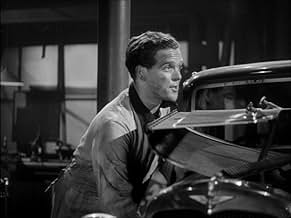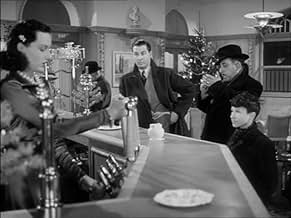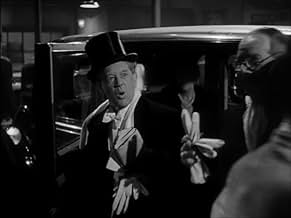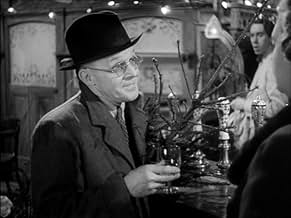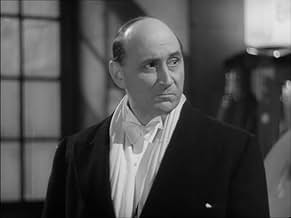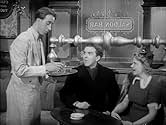Adicionar um enredo no seu idiomaAgainst Christmas backdrop, pub regulars led by bookie Joe Harris try to prove Eddie Graves' innocence before his scheduled execution for murder the next morning, as landlord awaits new baby... Ler tudoAgainst Christmas backdrop, pub regulars led by bookie Joe Harris try to prove Eddie Graves' innocence before his scheduled execution for murder the next morning, as landlord awaits new baby.Against Christmas backdrop, pub regulars led by bookie Joe Harris try to prove Eddie Graves' innocence before his scheduled execution for murder the next morning, as landlord awaits new baby.
- Direção
- Roteiristas
- Artistas
O.B. Clarence
- Sir Archibald
- (as O. B. Clarence)
- Direção
- Roteiristas
- Elenco e equipe completos
- Produção, bilheteria e muito mais no IMDbPro
Avaliações em destaque
British character actors at their best. The wonderful Gordon Harker stands out as usual but there isn't a weak link in the cast. The story is okay but doesn't matter that much, it's all about the atmosphere and the cast. A real comedy drama with the accent on the comedy. Why don't the make films like this any more and thank you Talking Pictures for making so many available.
I watched an absolutely charming piece of British ensemble called of all things "Saloon Bar" (1940), with Gordon Harker, Mervyn Johns, Elizabeth Allan, Joyce Barbour, Anna Konstam, Cyril Raymond, Judy Campbell, and others (among whom is a very young pre-teen Roddy McDowall. Taking place basically in a single setting on Christmas Eve or thereabouts, in an evidently pre-war bar, the ostensible idea behind this piece is to save a young man from being hanged in the morning for a murder he didn't commit. But - how to prove it... This began as a play written by Frank Harvey (who also contributed to the screenplay) and then was put on the screen by Angus MacPhail and Jon Dighton. This is one of the four films on Volume 10 of the Ealing Studios Rarities series put out in Britain in the last few years (total of 14 volumes). Mervyn Johns sits on his bar stool during the entire film without moving, drinking, and making wry and sarcastic comments endlessly, deliciously. Elizabeth Allan is Queenie, a bar tending girl the hapless accused was seeing before his sentence. A competing bartendress from another establishment is Judy Campbell. The landlord of the bar where nearly all of the action takes place has an expectant wife upstairs, and it seems that she's been bearing first a boy, then a girl, then a boy, then a girl, in alternate years for some time now. Meanwhile, between endless quaffs of endless Lion ale, Gordon Harker is trying to figure out who really murdered the old lady the young man on death row is accused of killing. If all this sounds, perhaps, somewhat predictable, maybe even stagnant, or boring - trust me, it isn't in the least. It crackles with wit and wonderful acting and direction and atmosphere. It is indelibly British, the definition of it for Americans who think they know what that means, but who really don't. If you're into what pre-World War II Britain was like, this is the essence, a time and a culture that just doesn't exist anymore at all, but which is captured here in a water drop under the spyglass perfectly. Simply great!
From 1940, the British "Saloon Bar" takes place mostly in a couple of bars as characters work to save a friend from hanging. Their friend, Eddie (Alec Clunes), has been convicted of killing an old woman for her money. The money hasn't been found; however, a list of the serial numbers were submitted to pubs and stores.
One of the bills shows up at the bar. The group endeavors to find out where it came from - is that person perhaps the murderer?
Warm film that takes place around Christmastime and is complete with awful carolers, one of whom is little Roddy McDowall.
The cast includes Mervyn Johns, Gordon Harker, Roddy Hughes, Elizabeth Allan as the condemned man's girlfriend, Joyce Barbour, and Judy Campbell. Allan is quite beautiful - I wasn't really familiar with her until this film. The acting was all solid from veteran character actors.
Recommended.
One of the bills shows up at the bar. The group endeavors to find out where it came from - is that person perhaps the murderer?
Warm film that takes place around Christmastime and is complete with awful carolers, one of whom is little Roddy McDowall.
The cast includes Mervyn Johns, Gordon Harker, Roddy Hughes, Elizabeth Allan as the condemned man's girlfriend, Joyce Barbour, and Judy Campbell. Allan is quite beautiful - I wasn't really familiar with her until this film. The acting was all solid from veteran character actors.
Recommended.
This is a thoroughly enjoyable film, compulsive viewing for all who might enjoy drinking in the pre-War atmosphere of London in 1939 and early 1940 just before the Blitz. The film is based on a stage play, a kind of early 'Mousetrap' concept, a whodunnit essentially taking place in a single set. The atmosphere of this saloon bar, where the main characters congregate, is brilliantly conveyed. The film is stuffed full of delightful character actors all doing a great job. The film is well directed by Walter Forde, an experience old-timer, two of whose better known films are 'Rome Express' (1932) and 'Bulldog Jack' (1935). This is quintessentially English, and since things which are quintessentially English barely exist any more, the film has thus become an invaluable archaeological artifact. The film may not be 'multi-cultural', but it is certainly 'multi-social', as every class of society participates in the action and interacts in a manner which will be fascinating to social historians. My wife and I, as old friends of Judy Campbell, were delighted to see her performance in this classic as 'Doris of the Shakespeare', at which she thoroughly excelled as a rather embittered young barmaid from a rival pub. The lead character is an extroverted bookie, played by Gordon Harker, who takes the lead in trying to clear a friend of a murder charge for which he will be executed on the following morning. The condemned man's girlfriend, another barmaid, is played by Elizabeth Allan. She is far less charming than Judy. I sat next to her a couple of times at dinner when she was an old lady and found her vanity really too much to take. It shows in this film. Mervyn Johns is terribly funny in this film, glum and solemn as he sits on 'his stool' and will not get off it for any reason, making wry comments throughout all the action. While everything else is happening, a baby is being born, some scruffy kids are singing Christmas carols (12 year-old Roddy MacDowell amongst them), there is a parody of a feather-headed chorus girl ('he behaved like a perfect gentleman, he took his hands away as soon as I asked him'), and any number of amusing characters and incidents. What happens about the whodunnit aspects must remain a secret, but does not disappoint. This film is a real joy, and should be reissued on DVD so that people can see it.
This is probably the greatest film, set entirely inside a pub, ever made (admittedly a small field). The interest is not on the whodunit plot, and certainly not on the plausibility of the premise that the regulars in a pub could solve a mystery in a single night before closing time. But the combination of a group of vintage character actors doing their stuff, in a setting dripping with nostalgic possibilities, is irresistible. Mervyn Johns at his most lugubrious, spending virtually the entire picture on a barstool; Gordon Harker as a bumptious bookie; Roddy Hughes as a vague, cheery doctor; a wonderfully characterised set of bar staff; a hilarious group of cheeky carol singers (including the young Roddy McDowall). The film gives a tremendous sense of the small communities in the middle of London in the immediate pre-war, and the transient populations of rich and poor alike who might wander through. The historians and sociologists can detect the wartime social solidarity about to break down; those who lived through the times can enjoy the nostalgia. Warm, funny and brilliantly realised.
Você sabia?
- CuriosidadesWhen the men are talking about bicycling, one of them asks another if he has been up to Herne Hill lately. This is a reference to the velodrome in that South London neighborhood, which is still operating.
- ConexõesReferences George Robey's Day Off (1918)
Principais escolhas
Faça login para avaliar e ver a lista de recomendações personalizadas
- How long is Saloon Bar?Fornecido pela Alexa
Detalhes
- Tempo de duração
- 1 h 16 min(76 min)
- Cor
- Mixagem de som
- Proporção
- 1.37 : 1
Contribua para esta página
Sugerir uma alteração ou adicionar conteúdo ausente


